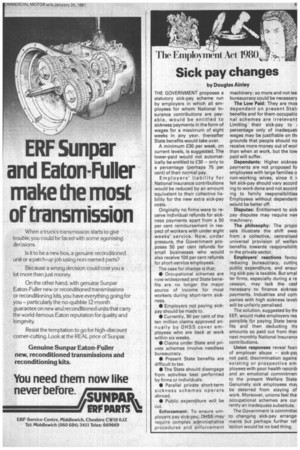Sick pay changes
Page 69

If you've noticed an error in this article please click here to report it so we can fix it.
by Douglas Ainley
THE GOVERNMENT proposes a statutory sick-pay scheme run by employers in which all employees for whom National Insurance contributions are payable, would be entitled to sickness payments in the form of wages for a maximum of eight weeks in any year, thereafter State benefits would take over.
A minimum £30 per week, on current levels, is suggested. The lower-paid would not automatically be entitled to £30 — only to a percentage (perhaps 75 per. cent) of their normal pay.
Employers' liability for National Insurance contributions would be reduced by an amount equivalent to their collective liability for the new extra sick-pay costs.
Originally no firms were to receive individual refunds for sickness payments apart from a 50 per cent reimbursement in respect of workers with under eight weeks' service. Now, under pressure, the Government proposes 50 per cent refunds for small businesses who would also receive 100 per cent refunds for short-service employees.
The case for change is that: IS Occupational schemes are now widespread and State benefits are no longer the major source of income for most workers during short-term sickness.
• Employers not paying sickpay should be made to.
• Currently, 90 per cent of the ten million claims approved annually by DHSS cover employees who are back at work within six weeks.
• Claims under State and private schemes involve needless bureaucracy.
• Present State benefits are difficult to tax.
• The State should disengage from activities best performed by firms or individuals.
• Parallel private short-term sickness schemes operate abroad.
• Public expenditure will be cut.
Enforcement: To ensure employers pay sick-pay, DHSS may reqUire complex administrative procedures and enforcement machinery: so more and not les: bureaucracy could be necessary The Low Paid: They are mos dependent on present State benefits and for them occu patio nal schemes are irrelevant Limiting • their sick-pay to percentage only of inadequate wages may be justifiable on the grounds that people should no receive more money out of worl than when at work, but the low paid will suffer.
Dependants: Higher sicknes: payments are not proposed fo employees with large families o non-working wives, since it i: felt sick-pay should vary accord ing to work done and not accord ing to family responsibilities Employees without dependant: would be better off.
Disputes: Entitlement to sick pay disputes may require nev machinery.
The philosophy: The prgpo sals illustrate the shift awe) from a collective, centralised universal provision of welfare benefits towards responsibilit) in the private sector.
Employers' reactions favou reducing bureaucracy, cuttin.c public expenditure, and ensur ing sick-pay is taxable. But smal ler firms, especially during a re cession, may lack the cash necessary to finance sicknesE payments. Industries and corn panies with high sickness leveh will be unfairly penalised.
The solution, suggested by tN EEF, would make employers res ponsible for paying State bene fits and then deducting thE amounts so paid out from theii next monthly National InsurancE contributions.
Union responses reveal fean of employer abuse — sick-pa not paid, discrimination agains. existing or prospective em ployees with poor health recordf. and an emotional commitmen. to the present Welfare State Genuinely sick employees ma\ be deterred from staying of work. Moreover, unions feel tha. occupational schemes are cur. rently an inadequate substitute.
The Government is Gomm ittec to changing sick-pay arrangements but perhaps further reflection would be no bad thing.








































































































